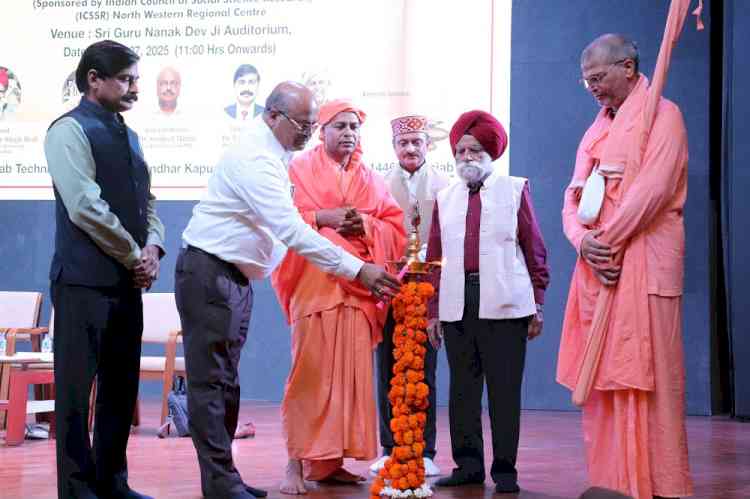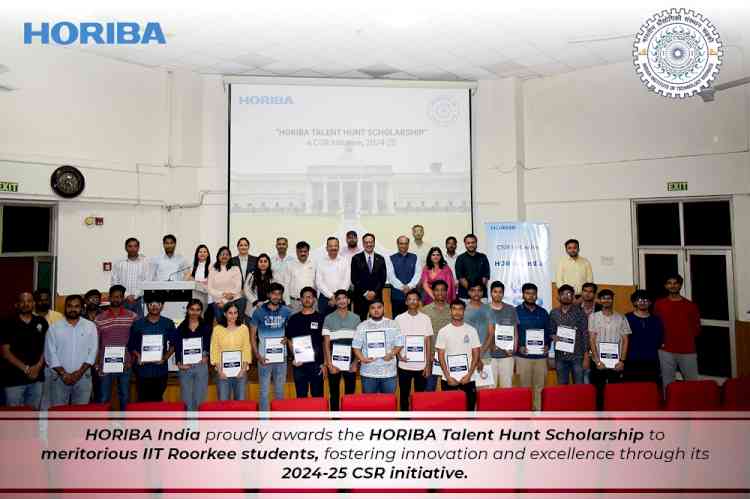IKGPTU organized One-day National Seminar on "Bharatiya Gyaan Parampara"
Monk & Scientist, Educationists and Spiritual speakers gathered on one platform, the history and present of the Indian knowledge tradition & system were discussed

Jalandhar/Kapurthala, April 7, 2025: A one-day national level seminar on "Bharatiya Gyaan Parampara" was organized at I.K.Gujral Punjab Technical University (IKGPTU) on March 27, 2025. Renowned scholars, students, Monk & Scientist, Educationists and Spiritual speakers participated in this event. The aim of the seminar was to highlight the vast history of Indian knowledge tradition & system, its scientific impact, technical and philosophical aspects. This was organized jointly by the team of the University's Center for Executive Education and Business Incubation Center. This seminar was also sponsored by the Indian Council of Social Science Research (ICSSR) North Western Regional Centre.
Renowned educationist Dr. Harmohinder Singh Bedi, Chancellor Central University Himachal Pradesh attended the seminar as the Chief Guest. HDG Srila Madhusudan Goswami Maharaj from Vrindavan attended as the Special Speaker. Renowned Monk & Scientist cum speaker Dr. Keshav Anand Das participated as the Keynote Speaker. Prof. (Dr.) Manu Sood, Department of Computer Science Himachal Pradesh University Shimla was also present as the Special Speaker. IKGPTU Vice-Chancellor Prof. (Dr.) Susheel Mittal was present as the Special Guest in the program, while the Registrar of the University Dr. S.K. Misra was the Convener of the program. The ceremony began with the lighting of the lamp.
Vice-Chancellor Prof. (Dr.) Susheel Mittal welcomed the guests with a memento and a bouquet. He told the students that the task of a student is not only to study and get a degree but also to give proper guidance to remove the evils prevalent in the society. To correct the evils prevalent in the society, it can be corrected only through the education received from saints, gurus, and educationalists.
Registrar Dr. S.K. Mishra said that attempts were made to destroy the ancient Indian culture, human values, and education system during different regimes. Which had a bad impact on our future generation. It is very important to consider this to revive our culture and language. This can be possible when we connect with archaeology, educationalists & religious personalities, researchers. He asked the students to read the Vedas, Gita, etc. of India, only then we can revive the Indian knowledge tradition.
Chief Guest Dr. Harmohinder Singh Bedi discussed the global significance of the Indian knowledge tradition and its implications for contemporary research. He said, "The Indian knowledge tradition is not only a historical heritage, but it is also an inspiring source for society and science today." During the seminar, Dr. Bedi gave detailed information about the greatness of the Indian knowledge tradition, its educational and cultural heritage and its usefulness in the modern era. He said that the Indian knowledge tradition is not limited to spirituality only, but it also makes significant contributions in the fields of science, technology, medicine and philosophy.
The speaker, renowned Madhusudan Goswami Maharaj Ji, said that the Indian knowledge tradition is not limited to books or religious texts only, but illuminates every aspect of life. He inspired the students to connect with this knowledge tradition by analyzing the philosophy, spirituality and scientific principles in Vedic knowledge, Upanishads, Bhagavad Gita and Sanskrit texts.
Dr. Keshav Anand Acharya presented a lecture titled "Bhagvad Gita – "The Priceless Heritage of the Knowledge Tradition", he said that the Bhagvad Gita is not just a religious text, but a scientific and life management key. He mentioned that the knowledge given in the Gita affects every aspect of human life - be it spirituality, ethics, management or psychology.
Dean RIC Dr. Yadwinder Singh Brar thanked the guests for sharing information about ancient times and various scriptures. All the officers, faculty members, staff and students of the university participated in the program.


 City Air News
City Air News 








